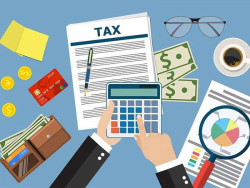
Demystifying Self-Employment Tax: A Comprehensive Guide
Understanding Self-Employment Tax
Self-employment taxes are key to working for your self. That Social Security and Medicare tax equal to the self-elected Social Security and Medicare tax is deducted from the employee’s paycheck. If you are self-employed, you are liable for paying the worker and business enterprise proportion of those taxes.
Who Needs to Pay Self-Employment Tax?
However, not any individual who earns his own expense is typically covered under the self-employment tax. The requirement is that anyone earning an excess amount of $400 through his net earnings from self-employment should pay self-employment tax. This tax, basically, would include freelance workers to independent contractors, small-business owners, and a variety of other self-employed individuals.
Calculating Self-Employment Tax
To calculate your self- employment tax, you may want to understand your net profits from self- employment. This is your total income minus any permissible business charges. The self-employment tax rate is applied to this net earnings figure.
Self-Employment Tax Rate
The self-employment tax is made from additives: 12.4% for Social Security and a couple of 0.9% for Medicare. Of these, best the first $142,800 of net profits is taxed for the Social Security portion. Additionally, a separate 0.9% Medicare tax applies to income that exceeds $200,000 for taxpayers submitting singly or $250,000 for married couples who report joint returns.
How to Report Self-Employment Income
The profits earned from self-employment is suggested in Schedule C (Form 1040) as a profit or loss from commercial enterprise. Keeping meticulous and distinct statistics is important to accurately reporting earnings and fees.
Deductions and Credits for Self-Employed Individuals
Self- employed individualities have colorful deductions and credits at their disposal to lower their tax liability. Business charges, home office deductions, and health insurance decorations are just some implicit deductions.
Estimated Tax Payments
Since self- employed individualities do not have taxes withheld from their hires, they're needed to make estimated tax payments throughout the time. These payments insure you meet your tax scores and avoid penalties.
Self-Employment Tax vs. Income Tax
It's important to distinguish between self-employment tax and income tax. Self- employment tax covers Social Security and Medicare, while income tax covers your overall taxable income. Understanding this difference is crucial for proper tax planning.
Quarterly Tax Filings
Daily tax forms are a necessity for the self- employed. These daily estimated tax payments keep you biddable with the IRS and help you avoid a large tax bill come tax season.
What is Form 1099-MISC?
Form 1099- MISC is a tax form used in the United States to report colorful types of income that individualities and businesses pay to non-employees, frequently appertained to as independent contractors or freelancers. The "1099" series includes colorful forms used to report different types of income, and "MISC" stands for miscellaneous income.
Common Mistakes to Avoid
Numerous self- employed individualities make common tax miscalculations, similar as underreporting income, failing to keep accurate records, or missing out on deductions. Avoiding these risks is essential for smooth tax operations.
Reducing Self-Employment Tax
There are legal ways to reduce your self- employment tax burden. Exploring deductions, credits, and withdrawal account options can significantly lower your tax liability.
Self-Employment Tax Exemptions
Certain individuals may be eligible for self-employment tax exemptions. Clergy members, members of religious orders, and certain foreign workers are some of the categories that may be exempt.
Legal Structures and Self-Employment Tax
The legal structure of your business can impact your self- employment tax. Sole occupancies, hookups, LLCs, and pots all have different tax counter accusations .
State Self-Employment Taxes
In addition to the federal self-employment tax, some states impose their own self-employment taxes. Understanding your state's tax laws is crucial for accurate tax planning.
Planning for Retirement as a Self-Employed Individual
Saving for withdrawal is vital for self- employed individualities. Options like a Simplified Employee Pension (SEP) IRA or a Solo 401(k) can help you secure your financial future.
Conclusion
Self-employment tax is an important consideration for anyone working for themselves. Understanding the rules, deductions, and exemptions can help you minimize your tax liability and build a more secure financial future.
FAQs
1. Do I have to pay self-employment tax if I have a part-time self-employed gig?
Yes, if your net earnings from self-employment exceed $400, you are subject to self-employment tax, regardless of the number of hours you work.
2. Are there any exemptions for older self-employed individuals?
No, there are no specific exemptions based on age for self-employment tax. However, age may affect other aspects of your tax liability.
3. What can I deduct as a business expense to reduce my self-employment tax?
You can deduct a wide range of business expenses, including office supplies, travel, and equipment costs. Consult with a tax professional for guidance.
4. How often do I need to make estimated tax payments?
Estimated tax payments are due quarterly, typically in April, June, September, and January. Make sure to adhere to the schedule to avoid penalties.
5. Can I change my legal structure to reduce self-employment tax?
Changing your legal structure can have tax implications. Consult with a tax advisor to determine the best structure for your situation.
